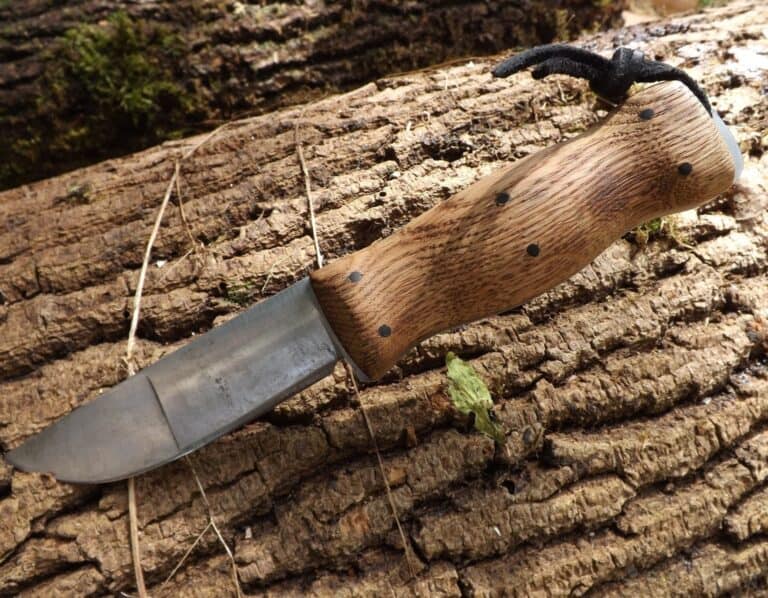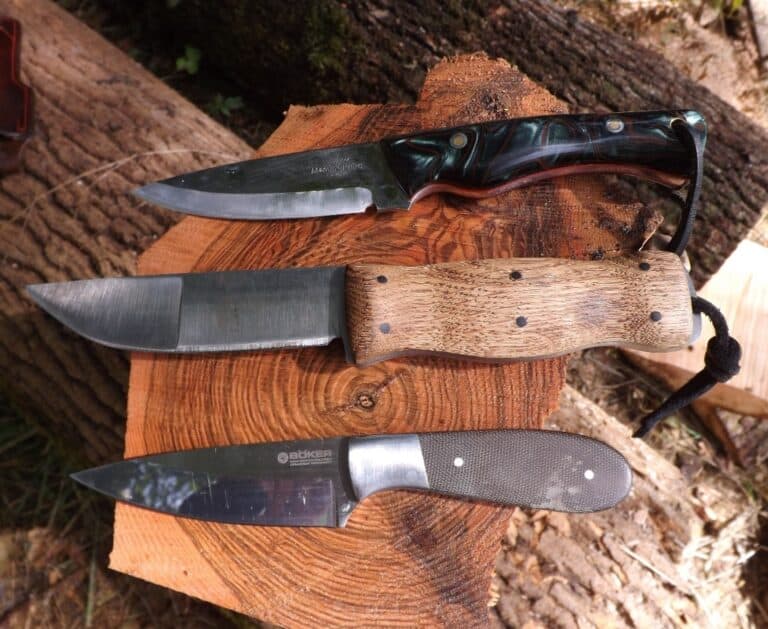Despite once having laws which demanded that everyone practice archery and stipulating what weapons you must own based on your social status the United Kingdom now has some of the strictest weapons legislation in the world.
And there is more on the horizon in the form of the new Offensive Weapons Bill which will be under consultation until September this year before potentially being enacted into Law.
The current legislation relating to knife ownership, purchase and carry in the UK is fairly simple and not too restrictive (let’s not even start talking about guns here, things are much worse).
There are a few knives and bladed weapons which are completely prohibited in the UK;
- butterfly knives (also known as ‘balisongs’) – a blade hidden inside a handle that splits in the middle
- disguised knives – a blade or sharp point hidden inside what looks like everyday objects such as a buckle, phone, brush or lipstick
- flick knives (also known as ‘switchblades’ or ‘automatic knives’) – a blade hidden inside a handle which shoots out when a button is pressed
- gravity knives
- stealth knives – a knife or spike not made from metal (except when used at home, for food or a toy)
- zombie knives – a knife with a cutting edge, a serrated edge and images or words suggesting it is used for violence
- swords, including samurai swords – a curved blade over 50 cm / 20 in (with some exceptions, such as antiques and swords made to traditional methods before 1954)
- sword-sticks – a hollow walking stick or cane containing a blade
- push daggers
UK Government
Many of these laws are replicated in some State laws in the US where specific prohibitions exist against certain types of knife. Some other laws exist to restrict the carry of certain types of knife without due cause.
For ‘edc’ purposes, anyone can carry a folding knife with a blade that is no more than 3 inches long fixed blades the following phrase from the Criminal Justice Act of 1988 applies;
“It is an offence for any person, without lawful authority or good reason, to have with him (or her) in a public place, any article which has a blade or is sharply pointed except for a folding pocket-knife which has a cutting edge to its blade not exceeding 3 inches.” [CJA 1988 section 139(1)]
Up until this point, I think the law as it related to knives was fairly sensible, but in the early 90’s a piece of case law was established that changed that.
A joint appeal to two convictions under the Criminal Justice Act of carrying offensive weapons despite the fact that the knives they were carrying had blades of under three inches established that knives with locking blades were effectively fixed blades and should be treated as such under law. The exact phrase from the hearing was;
“In my judgment, the right approach to the matter is this. To be a folding pocketknife the knife has to be readily and indeed immediately foldable at all times, simply by the folding process. A knife of the type with which these appeals are concerned is not in this category because, in the first place, there is a stage, namely, when it has been opened, when it is not immediately foldable simply by the folding process and, secondly, it requires that further process, namely, the pressing of the button.
For these reasons, I would give the answer to the questions in each case, that the tribunals were right to find as they did, and I would dismiss the appeals.
Harris v DPP 1993
Since that decision was made and became case law you have had to have the same good reason to carry a lock knife in a public place as a fixed blade. A good reason might be that you need the knife for work or for a legitimate pursuit such as hunting, fishing or camping.
And that’s where things stand in the UK at the moment, some knives are completely prohibited and some can’t be carried in public without good reason but the proposed new law will change things and make the legislation much more restrictive.
The scope of the bill is broader than just knives, it covers the sale of corrosive substances to under 18 year olds in an effort to combat a spate of acid attacks and proposes to clarify legislation on existing illegal weapons such as ballisongs and automatic knives.
It also proposes to ban the carrying of knives on college campuses, this may not initially appear to be a problem.
But, as a college lecturer specializing in vocational wildlife management, my students and I use knives on a daily basis as we manage the college’s large farm, rear pheasants, quail and deer, and manage the sporting shooting and hunting on the estate so this might be a problem for me and my students.
I have trained countryside and wildlife management students for and have seen students from all walks of life using knives, tools and guns and have NEVER had a student live down to the negative expectations society sometimes places on them.
They have never behaved irresponsibly with these tools and have demonstrated care and conscientiousness under all circumstances.
The Bill not only affects college students though and in fact the most serious issue with it is article 15 which relates to the delivery of knives and bladed tools to residential addresses. This is where the bill not only has a particular impact on outdoorsmen, preppers and survivalists but on every law abiding citizen.
The proposal is that knives will no longer be delivered to people’s homes, the rationale is that the law prohibits knives to be sold to persons under the age of eighteen and online knife stores have proven to be unreliable in making valid age checks on customers.
The big online sellers are very thorough but the number of smaller ones that didn’t carry out proper checks was a concern to the government and is one of the things that prompted this new Bill.
Another factor which prompted the Bill was the concerning rise in knife crime particularly in London since the beginning of 2018 were there have been at least 51 fatal stabbings since the start of 2018.
The fact that knives are making it into the hands of young people and gangs who are responsible for some of these crimes is obviously a concern and article 15 of this proposed offensive weapons bill aims to combat this.
However it seems to be going about it in a way which limits law abiding people’s ability to purchase knives and criminalizes their legitimate and essential uses
Under the proposed new law, knives will either have to be collected in person from the place of purchase or collected from a collection center, such as a post office, where the buyer’s age can be properly verified.
I received a Jaakaripuuko 140 that is only available from one retailer based in Finland. Likewise a J P Peltonen Sissipuuko M07 Ranger Knife, also originating in Finland is not available from UK-based retailers either.
None of these can be obtained from any brick and mortar shop in the UK, and postal delivery is the only option if you want to purchase one.
If someone want one of these knives do they now have to complicate their purchase of these TOOLS by having to travel a long way to purchase them at source, incurring significant inconvenience and additional cost, or pick them up from a ‘collection centre’?
Knives are among the oldest metal tools known to man and long before copper bronze and steel were used to make blades flint, bone and chert were the material of choice for cutting tools. If the new Bill is to limit people’s ability to purchase knives, and therefore own them is that really justified?
I was so concerned by the contents of this new Bill that I wrote a letter to my Member of Parliament with some key questions about the proposed Bill.
I was concerned that there was a lack of evidence that knives purchased online were linked to crime and asked if the government could present this evidence.
I was also concerned that as a freelance bushcraft and survival skills instructor I would, under the proposed Bill, not be able to order bladed tools and knives to be delivered to my home address which would affect my ability to conduct my business.
I was also concerned that the livelihoods of custom knife makers would be effected as a lot of them conduct their business almost exclusively by mail order, I was lucky enough to receive a custom made knife from Texas based knife maker William Collins a few months ago, and I feared there was a distinct possibility that this was an opportunity that would be denied people in the future.

I was also concerned that if knives would now have to be retrieved from ‘collection centres’ and formal identification and age verification checks would be carried out how would this data be used by government.
Would people purchasing and having to collect knives in public be ‘profiled’ and treated unfairly by staff at collection centers, or by people who work out they are picking up knives, are they going to be perceived as criminals just because now it’s clear they are collecting knives.
While I have not yet received a response from my MP there is currently an open petition being signed in the UK to ask for article 15 to be removed from the proposed bill.
As of today, there are over 21 thousand signatures which elicited a response from Parliament on the 18th of July 2018, their statement in response to the petition is as follows;
“Retailers online and offline are prohibited from selling knives to under 18s. Evidence from online test purchase operations conducted over the last decade, where online shopping has become increasingly common, shows that the majority of sampled online retailers failed to have effective age verification procedures in place. The failure rate for online test purchases of knives has not significantly improved over this period.
The Government has therefore sought to improve these outcomes by conducting a public consultation and introducing legislation that will place more stringent controls on online sellers of knives.
Following concerns expressed in the consultation, certain defences were introduced into the Bill that has been published. The prohibition on the delivery of knives to residential addresses is now limited to those knives that can cause serious injury. If ordered online these knives will need to be collected from a place where age verification can take place, either by the purchaser or their representative.
In respect of other bladed items and knives, the Bill provides a number of defences around the prohibition of delivery to a residential address. For example, deliveries to business premises, including where a business is run from home, would not be affected by the prohibition placed in the Bill on delivery to a residential address.
Other items that would be exempt from the prohibition on delivery to a residential address would include encased razor blades; knives with a blade of less than 3 inches; knives that cannot cause serious injury, for example table knives; bladed products designed or manufactured to specifications from the buyer such as bespoke knives.
There are also exemptions for bladed products that are used for sporting purposes, such as fencing swords and bladed products that would be used for re-enactment activities.”
UK Home Office
While this response from the home office doesn’t address all my concerns it does at least address the issue of custom knife makers who produce “bladed products designed or manufactured to specifications from the buyer such as bespoke knives” and confirm that they will still be able to conduct their business more or less as usual.

Even though these few changes and reassurances will allow people who run their businesses from home can still order knives and tools to be sent to their home addresses, this is a small comfort for the steadily eroding freedom and rights of people to purchase knives in the UK.

Geoff is a lecturer at Hartpury College. He has been teaching at colleges for eight years and in that time has worked at some of the most prestigious land based colleges in Britain. He trained as a professional hunter and game keeper and as well as his teaching job he still manages deer professionally as a deer stalker, carrying out culls, guiding clients and advising on deer management strategy.
He has operated his own bushcraft and survival skills training companies since 2010 and has also managed outdoor and environmental education centers in Norfolk and Scotland over the course of his career. A keen traveler, Geoff has honed his survival skills in New Zealand and Scandinavia, he speaks fluent Swedish and has proven his bushcraft ability on many expeditions.
Several of these expeditions were on long distance trails in the UK to raise money for Whizz Kidz a charity that supports disabled children, Geoff has hiked over 2000 miles in aid of this charity.
